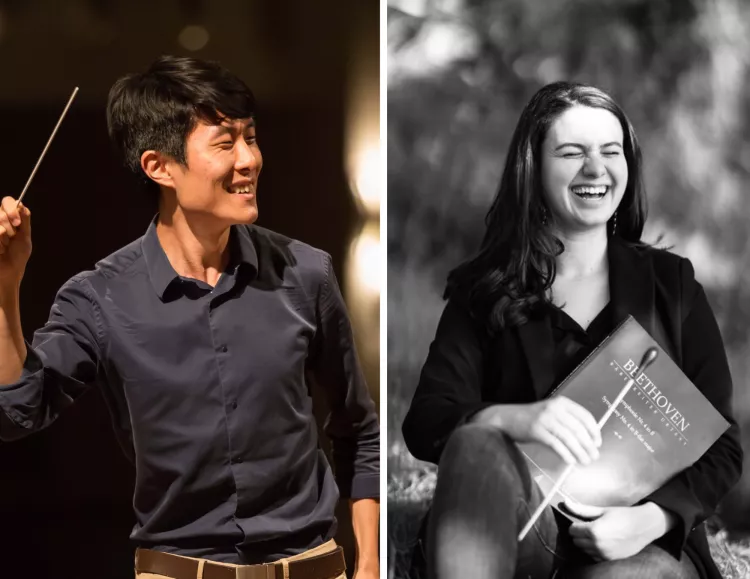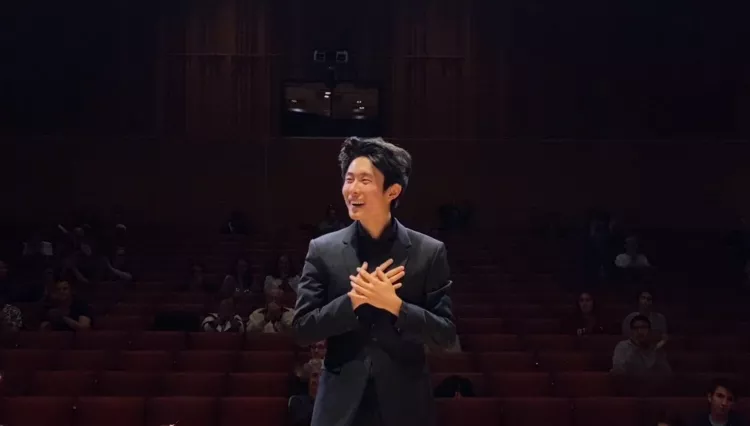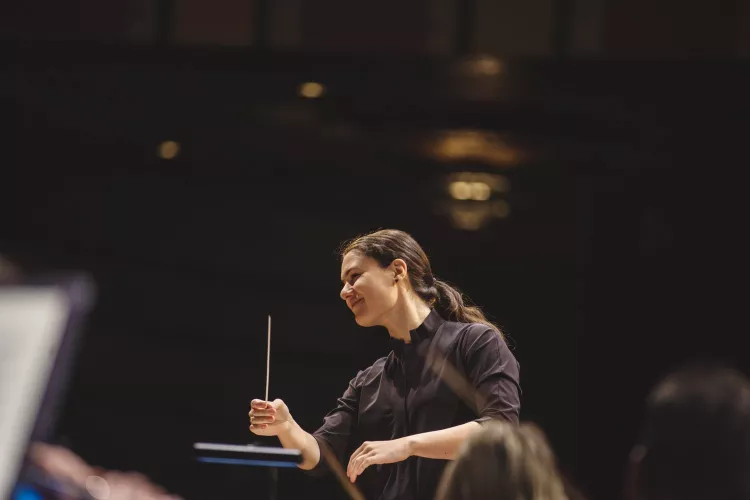Conductors, Colleagues, and Confidants: Andrew Kim '18, Shira Samuels-Shragg '20 Thrive in Musical Careers

Just a few short years after graduating from Swarthmore, Andrew Kim ʼ18 and Shira Samuels-Shragg ʼ20 have had remarkable success in their early conducting careers. Despite Swarthmore being a liberal arts college and not a conservatory, they have benefited tremendously from the connections and opportunities provided during their education in Lang Music and the college’s liberal arts approach.
"I got into conducting purely thanks to Swarthmore,” Kim said, with his original career plan being investment banking. A revelatory performance of Mozart’s Requiem in his junior year of high school helped him realize he wanted to be a performer, and with no musical background and a passion for English, Swarthmore seemed like the perfect intersection of his interests.
"Swarthmore really changed my life in that it allowed me to do conducting. If I had showed up without having a musical background at another school and said I wanted to conduct, people would have said, ‘What are you talking about?’ But thankfully Andrew Hauze was so understanding and was willing to give me a chance to learn conducting, and he really built my skills from the ground up,” Kim explained. Professor Hauze ʼ04 has been instrumental to both Kim and Samuels-Shragg’s journeys, becoming both a mentor and friend over the years.
"He really went above and beyond for me in my four years to build my fundamental skills and give me extraordinary hands-on opportunities to help me apply that knowledge to my actual work on the podium. And here I am as a conductor now!” Kim said. He is currently finishing his doctoral degree at the University of Minnesota and next fall he starts as the music director of the New York Youth Symphony, widely reputed to be one of the best of its kind in the nation.

Andrew Kim at Ithaca College
Samuels-Shragg, on the other hand, got into conducting early. With a love for chamber music and playing the viola in orchestra, she found practicing solo piano pieces by herself lonely. Writing a paper on women conductors in the eighth grade inspired her to conduct for her school orchestra.
"I was totally hooked. I thought, ‘This combines my three favorite things: music, dance, and being in charge, and I have to do more of this!’” Samuels-Shragg continued conducting throughout high school. While in search of an undergraduate program where she could study music, she was connected to Swarthmore.
"I had a phone call with Andrew Hauze my senior fall of high school, and he was just so warm and engaging and honest. He said, ‘Look, our orchestra is not conservatory level, but if you come here, I will do everything I can to help you grow as a conductor,’ and he really did.” Hauze prepared both Kim and Samuels-Shragg for the competitive reality of grad school through countless hours of lessons, skills training, and above all, podium time with his ensembles.
Samuels-Shragg went on to earn a master's of music in orchestral conducting from The Juilliard School. Currently, she is the assistant conductor for the Plano Symphony Orchestra, and has conducted the Spokane, and Corpus Christi symphonies. She will be conducting the South Bend Symphony Orchestra in April.
"It was kind of crazy that he got both Andrew [Kim] and me into music conservatories for grad school. So anytime one of us has something exciting or successful happen in our conducting lives, Andrew [Kim] and I text each other, ‘A win for Team Hauze!’ He’d be very embarrassed that we do that, but we do,” Samuels-Shragg says, laughing.
Getting into Juilliard was an arduous process: Samuels-Shragg described sending the school videos of her conducting the Swarthmore orchestra, after which, she was invited for a live audition. She recalled calling Hauze after she heard back.
"I called Andrew and told him, ‘The good news is that I got a Juillard audition! But the bad news is that I have to learn a lot of wacky, complex music,” Samuels-Shragg said. Hauze helped her learn how to conduct and analyze the music in the months before her live audition. While she described being nervous before, she let the music calm her down during, and left feeling as though she had done her best. Samuels-Shragg was one of two students to be admitted into Juilliard’s conducting program, which provided her with multiple once-in-a-lifetime opportunities, such as conducting John Williams’ music in front of him.
"At the end of my second year, my teacher had organized a session where the orchestra and conducting students would be performing music by John Williams. Williams happened to be in New York at the time and he came to watch us conduct one Friday morning. I conducted music from E.T. and Jurassic Park in front of him, and it was nerve-wracking, but he was so kind,” Samuels-Shragg described.
Conducting is especially meaningful for Kim for the ways in which it combines an academic, intellectual approach to music with an emotional one, further tying that in with a social and psychological method to working with people.
"A lot of our work starts off at the desk,” Kim said, gesturing to the scores he had in front of him. “It’s a self-process of learning and studying the music on my own in an intellectual way, and then the psychological, inspirational work begins when we go to rehearsal.”
Samuels-Shragg adds, “I would say I envy how much Andrew [Kim] enjoys the studying part. I do enjoy learning music once I sit down and do it, I couldn’t be a conductor if I didn’t. But it’s like my joke earlier about how the piano was too lonely. Joke's on me because conducting is really lonely! About 98% [of conducting] is work you do in a room by yourself before you get to connect with people. That part is tough, but every time I do get to work with an orchestra, it’s so rewarding that it propels me through my next study phase.”
For Samuels-Shragg, conducting is most fulfilling when she can create an atmosphere where the 80 people in front of her can do their job the best they can. In her graduate studies at The Juilliard School, she described being surrounded by incredibly talented musicians and experimenting with how to best allow them to do something they’ve spent their whole lives perfecting. The moment everything clicks is emotional and powerful for Samuels-Shragg.
"Orchestral music is such a wonderfully unique art form in that it requires so many individuals to commit to showing up for it to exist,” she says.
Kim and Samuels-Shragg have continued showing up for one another over the years — from the first time they met in 2016 to now, they remain dear friends. Samuels-Shragg described coming in to her first year at Swarthmore, wanting to be a conductor and watching Kim, a junior at the time, conduct the school orchestra, inspiring her to make it a goal for herself. The following year, Kim and Samuels-Shragg were the chosen student conductors.

Shira Samuels-Shragg conducts the Spokane Symphony Danny Cordero Photography
"Andrew [Kim] was such an important, just kindred spirit. If you’re at a conservatory, like Juilliard, the practice hallways are full until one in the morning and you’re all in it together. One of the things I loved most about Swarthmore however, was that it wasn’t a music conservatory. But it could be really lonely and isolating to be the last one in the Lang corridor at night, and so to have a buddy down the hall was so nice,” Samuels-Shragg expressed. They took frequent study breaks, sitting on the couches by the elevator to chat and let off some steam before going back to studying music.
Kim remembers being highly stressed in his last two years at Swarthmore. Determined to get into a conducting master's program, he described feeling like he was always running out of time because he didn’t come from a musical background. Samuels-Shragg was key in helping him feel less overwhelmed.
"We balance each other out very well. [For a long time] I didn’t have a colleague that was conducting who I shared a natural close connection with. When Shira came, it was a source of joy from the very beginning. Every moment we spent together was a relaxing moment through my lonely, stressful time. It was so meaningful to have a friend like that, someone you can be passionate about music with,” Kim said.
Samuels-Shragg describes her year as a sophomore and Kim’s as a senior as a “golden time” in her life.
When asked about advice for students interested in conducting, the duo had much to say. Kim believes developing, cultivating, and maintaining a passion, love, and curiosity for music is crucial. Despite the challenging moments in conducting, and life at large, Kim explained he always finds himself coming back to music and his pure love for it. At the end of a tiring day, it is that love that serves as the best source of fuel and energy. Samuels-Shragg too believes in the power of curiosity.
"Something that was great about Swarthmore was that I couldn’t only do music all the time — it allowed me to develop other interests. It’s also crucial to understand that music never exists in a vacuum. It always exists in a world that’s full of a million other things that are affecting and being affected by music, so it’s key to have a general curiosity about the world,” suggests Samuels-Shragg.
Kim added how important it was to find a mentor and the right support. “Again, Andrew [Hauze] has been such a formative and foundational mentor for me, and he continues to be. If I didn't have him at Swarthmore in those four years, I wouldn't have been able to become a conductor on my own. It's very moving, actually, because he didn't really know me when I first met him. We're not connected by blood or any other means, but he has just dedicated extraordinary, extraordinary amounts of time to me and Shira. And just having that kind of support means a lot. We're just grateful for Andrew [Hauze] and our time at Swarthmore.”



